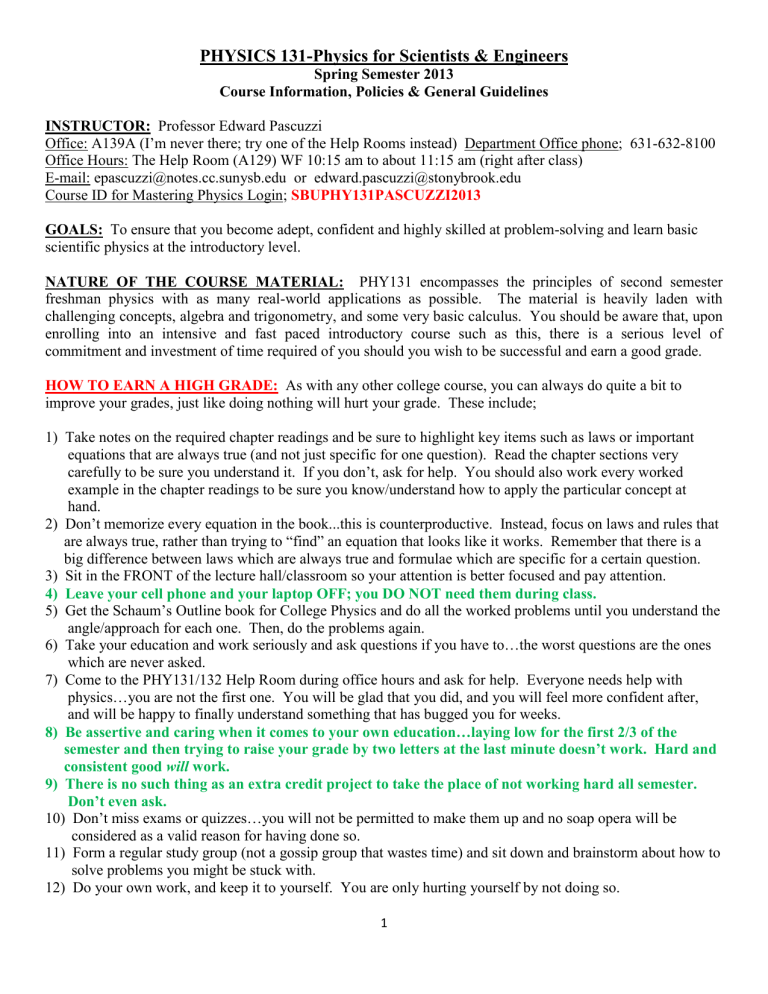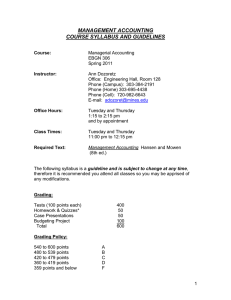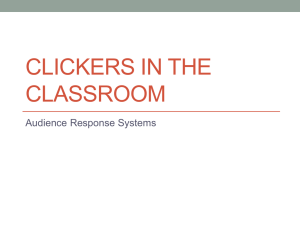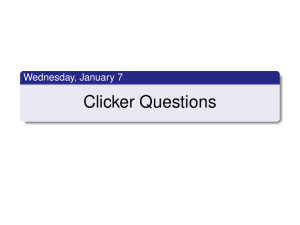
PHYSICS 131-Physics for Scientists & Engineers Spring Semester 2013 Course Information, Policies & General Guidelines INSTRUCTOR: Professor Edward Pascuzzi Office: A139A (I’m never there; try one of the Help Rooms instead) Department Office phone; 631-632-8100 Office Hours: The Help Room (A129) WF 10:15 am to about 11:15 am (right after class) E-mail: epascuzzi@notes.cc.sunysb.edu or edward.pascuzzi@stonybrook.edu Course ID for Mastering Physics Login; SBUPHY131PASCUZZI2013 GOALS: To ensure that you become adept, confident and highly skilled at problem-solving and learn basic scientific physics at the introductory level. NATURE OF THE COURSE MATERIAL: PHY131 encompasses the principles of second semester freshman physics with as many real-world applications as possible. The material is heavily laden with challenging concepts, algebra and trigonometry, and some very basic calculus. You should be aware that, upon enrolling into an intensive and fast paced introductory course such as this, there is a serious level of commitment and investment of time required of you should you wish to be successful and earn a good grade. HOW TO EARN A HIGH GRADE: As with any other college course, you can always do quite a bit to improve your grades, just like doing nothing will hurt your grade. These include; 1) Take notes on the required chapter readings and be sure to highlight key items such as laws or important equations that are always true (and not just specific for one question). Read the chapter sections very carefully to be sure you understand it. If you don’t, ask for help. You should also work every worked example in the chapter readings to be sure you know/understand how to apply the particular concept at hand. 2) Don’t memorize every equation in the book...this is counterproductive. Instead, focus on laws and rules that are always true, rather than trying to “find” an equation that looks like it works. Remember that there is a big difference between laws which are always true and formulae which are specific for a certain question. 3) Sit in the FRONT of the lecture hall/classroom so your attention is better focused and pay attention. 4) Leave your cell phone and your laptop OFF; you DO NOT need them during class. 5) Get the Schaum’s Outline book for College Physics and do all the worked problems until you understand the angle/approach for each one. Then, do the problems again. 6) Take your education and work seriously and ask questions if you have to…the worst questions are the ones which are never asked. 7) Come to the PHY131/132 Help Room during office hours and ask for help. Everyone needs help with physics…you are not the first one. You will be glad that you did, and you will feel more confident after, and will be happy to finally understand something that has bugged you for weeks. 8) Be assertive and caring when it comes to your own education…laying low for the first 2/3 of the semester and then trying to raise your grade by two letters at the last minute doesn’t work. Hard and consistent good will work. 9) There is no such thing as an extra credit project to take the place of not working hard all semester. Don’t even ask. 10) Don’t miss exams or quizzes…you will not be permitted to make them up and no soap opera will be considered as a valid reason for having done so. 11) Form a regular study group (not a gossip group that wastes time) and sit down and brainstorm about how to solve problems you might be stuck with. 12) Do your own work, and keep it to yourself. You are only hurting yourself by not doing so. 1 NOTE; THERE ARE NO EXTRA CREDIT PROJECTS IN THIS COURSE TEXTBOOK AND REQUIRED MATERIALS: The text used is Giancoli, Physics for Scientists and Engineers, 4th edition (Pearson Prentice Hall), and is available with the Student Access Code to facilitate logging on to MasteringPhysics.com to complete homework assignments. If you choose not to purchase the text, you will still be responsible for purchasing the Student Access Code for access to MasteringPhysics.com to complete online homework assignments. CLASS TIME/LECTURE: MWF, 9:00 am – 9:53 am, in the Simons Lecture Hall, Simons Center for Geometry & Physics (adjacent to the Math Building). Lecture time encompasses the introduction of necessary physics material, concepts and demonstrations commensurate with the course, which includes time to learn and hone your problem-solving skills. PLEASE DO NOT BRING ANY FOOD INTO THE LECTURE HALL. IF YOU DO YOU WILL BE ASKED TO LEAVE AND EAT IT IN THE LOBBY. PLEASE HAVE YOUR BREAKFAST BEFORE CLASS. BLACKBOARD: Most of the course administration will be done via Blackboard. “Blackboard” is blackboard.stonybrook.edu and nearly all of the administration of the course will be done through Blackboard, so you must be sure that your correct email address is listed there. During the course, announcements will be posted and sent via email to you concerning updates, changes, etc., and you will also have access to many other items such as supplementary problems for practice to prepare for quizzes and exams. Note that in order to keep up to date with course postings on Blackboard, you must a) have a valid and real email address posted there with your course registration and b) you must READ your email daily. SBU ACADEMIC CALENDARS: Go to; http://www.stonybrook.edu/registrar/calendar-academic.shtml LABORATORY: As of Spring 2012, the lab courses for PHY131 and PHY132 are now separate from the main course and thus are operated and administered by an instructor other than your PHY131/132 instructor. Consult your TA or Prof. Abhay Deshpande in the main Physics Department office if you have any concerns. MAIN TOPICS: The course will cover material presented in Chapters 1 through 20 of the text which cover the following topics; kinematics, projectiles, Newton’s laws, friction, gravity, work, power, energy, momentum, rotation, torque, circular motion, oscillations, statics, fluids, heat, calorimetry, thermodynamics and basic waves. This will predominantly cover Chapters 1−20 in Giancoli’s textbook. HOMEWORK: The importance of learning and understanding physics lies predominantly with becoming adept at problem-solving, a necessity we will cover constantly during every class. To better facilitate both the administration and grading of your homework problems, the Physics Department has invoked online homeworks through MasteringPhysics.com, for which you must purchase an access code (provide your access code to create an account and then access course homework using the code given at the top of this document). The responsibility is yours when it comes to working out homework problems in order to best understand the 2 applications of the laws and concepts involved. Therefore, there will be numerous homework problems assigned during each class which will be graded during the following class during recitation. If you find that you are having any difficulty, please do not hesitate to come for extra help. Since the semester is only about six weeks, it is imperative that you stay on top of your own work. Assignment due dates will be clearly shown on MasteringPhysics.com and it will be up to you to check for the next assignments as the course moves along. QUIZZES: Expect short quizzes will be given weekly in recitation, as per your recitation instructor’s discretion and guidelines. If you miss a quiz it will most likely be counted as a zero, so please bear this in mind. Further information regarding this will be disseminated as the semester gets underway. EXAMS: Approximate exam dates are shown in the syllabus and occur approximately every 12 lectures, thus making three per semester (one is February, one in March and the last in April), all during lecture. If you miss one with no medical reason your grade for it is zero. Date and time of the Final Exam will also be announced soon. NOTE; THERE ARE NO EXTRA CREDIT PROJECTS IN THIS COURSE COURSE POLICIES & GRADING: Your course grade will be based on the following assignments with the percentages shown (PLEASE N OTE THESE ARE APPROXIMATE AND MAY CHANGE); Clicker Questions – 5% Online homework problems – 15% Quizzes (recitation) – 15% Hourly Exams – 30% (i.e. 10% for each exam) Final Exam – 35% The approximate grading schema for letter grades in PHY131 is as shown below. Note there are no curves on anything, so if you earn a low, unwanted grade, work harder for the next exam or enroll in the course at a different time in the future. These numerical cutoffs are “the curve.” A A− B+ B B− C+ C C− D+ D F Percentage 90-100 87-89 83-87 78-83 72-77 68-72 63-68 58-63 53-58 50-53 below 50 3 DISABILITY SUPPORT SERVICES (DSS) STATEMENT: If you have a physical, psychological, medical or learning disability that may impact your course work, please contact Disability Support Services, ECC (Educational Communications Center) Building, room128, (631) 632-6748. They will determine with you what accommodations, if any, are necessary and appropriate. All information and documentation is confidential. Students who require assistance during emergency evacuation are encouraged to discuss their needs with their professors and Disability Support Services. For procedures and information go to the following website: http://www.stonybrook.edu/ehs/fire/disabilities. It is YOUR responsibility to notify your professors BEFORE an examination or quiz that you do/do not wish to take advantage of your testing modification in the DSS office. If I do not hear from you 24 hours in advance of an exam or quiz, you will take the exam or quiz with the entire class in the lecture hall. NOTE; THERE ARE NO EXTRA CREDIT PROJECTS IN THIS COURSE ACADEMIC INTEGRITY STATEMENT: Each student must pursue his or her academic goals honestly and be personally accountable for all submitted work. Representing another person's work as your own is always wrong. Faculty are required to report any suspected instances of academic dishonesty to the Academic Judiciary. Faculty in the Health Sciences Center (School of Health Technology & Management, Nursing, Social Welfare, Dental Medicine) and School of Medicine are required to follow their school-specific procedures. For more comprehensive information on academic integrity, including categories of academic dishonesty, please refer to the academic judiciary website at http://www.stonybrook.edu/uaa/academicjudiciary/ . Students discovered cheating on assignments will receive a grade of F for the course and will likely face potential expulsion from the university. CRITICAL INCIDENT MANAGEMENT: Stony Brook University expects students to respect the rights, privileges, and property of other people. Faculty are required to report to the Office of Judicial Affairs any disruptive behavior that interrupts their ability to teach, compromises the safety of the learning environment, or inhibits students' ability to learn. Faculty in the HSC Schools and the School of Medicine are required to follow their school-specific procedures. 4 Some PHY131 FAQs: “I don’t like my lab TA and want to switch to another lab section. Can I?” The short answer is …no. Here’s the long answer;….In life, you will be required to work with all types of people from all walks of life with all sorts of personalities, some acceptable, some intolerable, and as a result, you must learn to accept this, taking a deep breath and being mature about it. If there is a specific problem concerning grading or if something is unclear, simply ask your TA and come to a mutual and mature agreement. “I want a higher grade!” Then you must work for it. As described above, the grade you earn is the grade YOU EARN…it is not a made-up number pulled out of a hat. Physics is very challenging, and what is even more challenging is taking two physics courses over the summer, which means that you must eat, breathe, sleep and involve yourself in physics 24/7. If you are still having trouble, get a review book, do ALL the problems, get a private tutor or come for free extra help in the Help Room, A129. Remember that AFTER the final exam, GRADES ARE NOT CHANGED TO SUIT YOUR NEEDS/WANTS/DESIRES. If you need a certain grade, EARN IT. “I have to attend a party and will miss a quiz. Can I make it up?” No. There are no makeups for anything in the course unless there is a dire emergency WITH a documented letter from a family or ER physician which can be verified. “I have to go to the beach to work on my tan and will miss a lab. Can I make it up?” No. There are no makeups for anything in the course unless there is a dire emergency WITH a documented letter from a family or ER physician which can be verified. “My clicker doesn’t work, it must be your fault.” Clickers are funny and unpredictable things as they deal with a wireless system. First, check the following; 1) Did you register the clicker CORRECTLY through Blackboard? Note you will NOT receive credit for your clicks if they come in from an UNREGISTERED clicker as they show up with no name. 2) Did you set the clicker channel correctly (Ch. 41)? 3) Are you clicking and sending “note to teacher?” This does not count as a click. 4) Did you go to the Faculty Center in the library to see the clicker expert, Jennifer Adams? 5) Did you try calling the Clicker Helpline at 1-866-746-3015? “My friends want to sleep and asked me to click for them. I’m sure you don’t mind.” First Offense; When a student is caught with multiple clickers, all clickers will be taken for the duration of the class, numbers recorded and all students associated with said clickers will receive a zero clicker grade for 4 weeks thereafter. 5 Second Offense; All students associated with said clickers will have their names submitted to the University Academic Judiciary board and may face hearings to determine whether or not they will be expelled for cheating. All students associated with said clickers will receive a clicker grade of zero for the entire semester. “My Exam was misgraded and I want a regrade.” Generally, exams and quizzes are NOT regraded once a student leaves the room in which the exams and quizzes are returned, for obvious reasons. Therefore, you must look your paper over VERY carefully immediately after it is returned to you and then return it to your recitation instructor, WITH A VERY SPECIFIC NOTE ON THE FRONT DETAILING THE PROBLEM who will in turn submit it to your professor for a regrade. You must realize that if a paper of yours is regraded, the final score may actually turn out to be lower than the original score. “Since I’m enrolled in a very competitive university and tough class, can I just cheat instead of working hard?” Being mature young adults, this choice is in your hands to decide, however, once you are caught, you face a disciplinary hearing board which will decide whether or not to permanently expel you from the university (without tuition reimbursement) and give you an F for the course. Further, you will have to face your parents and family and explain this, and this will likely be something that will accompany you through your entire college career (if you are lucky to continue having one after being caught). Additionally, students must realize that every motion they make on MasteringPhysics.com is tracked, and analyzed to unearth cheaters, and that students who make ghosting accounts on that website are immediately flagged by cross-referencing with the Blackboard roster for the class. Such accounts are immediately disabled for the duration of the course, whereupon disciplinary actions are taken against the student/s, as outlined above. In short, do your own work and seek extra help when necessary. 6



